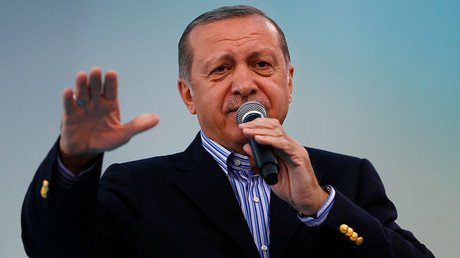In a widening diplomatic rift between Turkey and the EU, President Recep Tayyip Erdogan has made a new provocative statement saying that the “collapsing” Europe “will pay” for “humiliating” and “oppressing” Turks living on the continent.
“They said a century ago that we were the 'sick man.' Now they are the 'sick man.' Europe is collapsing,” the Turkish leader said, using an insult popular among European politicians in the 19th century when they talked about the collapsing Ottoman Empire.
Speaking at a rally in Turkey’s Izmir on Sunday, the president said that Europe’s economy was getting worse, its population was getting older, and the “racism disease has resurged like a virus,” Turkish Anadolu news agency reported. In Europe, which suffered two world wars in the past, millions of people are being attacked and discriminated against, he told the rally.
Erdogan claimed that Turks living in Europe were being “very oppressed” and “very humiliated,” and vowed to make Europe “accountable” for that.
“Europe will pay for what they have done. God willing, the question of the European Union will again be on the table after April 16,” he said, referring to the constitutional referendum in Turkey, which might sharply increase his ruling powers.
“You have seen what happened in Europe. Why did they go crazy? Why did they go berserk? They saw what this system will bring to Turkey. Turkey is leaping, growing. This makes them go crazy,” Erdogan explained his view on the tensions with the EU.
The Turkish leader reiterated his plans to hold a separate referendum on whether Ankara should carry on with a process to join the European Union, saying he now expects “a serious explosion in the rate of votes” to quit the EU accession bid. “I do not worry about it,” he said.
Turkey, which has been negotiating an entrance into the 28-member European bloc for decades, has consistently faced criticism from the EU for its record on human rights, democracy and freedom of the press.
Talks between Ankara and Brussels are also directly linked to a controversial €6 billion refugee deal, which Turkey repeatedly threaten to suspend. Brussels for its part says that Turkey failed to honor some of the 72 conditions set by the EU for lifting the visa requirements.
These concerns escalated in the aftermath of the attempted coup in July, which saw a mass crackdown on opposition figures including teachers, journalists and civil servants deemed sympathetic to Kurdish separatism and self-exiled cleric Fethullah Gulen, who Ankara says masterminded the coup.
Tensions between Turkey and EU countries have also been heightened in the run-up to the upcoming Turkish referendum which is scheduled later this week. Erdogan and his AKP party have relentlessly tried to campaign in Europe for a ‘yes’ vote in the plebiscite which could be decided by some 5.5 million Turkish citizens living abroad.
But the push by Ankara to hold political rallies by the Turkish politicians in the EU have been met by strong opposition, most notably by Berlin and Amsterdam after these countries have barred several political rallies. Erdogan accused both countries of racism and “Nazi practices.”
The proposed amendments to the constitution would give the office of the president the power to issue decrees, declare emergency rule, appoint ministers and state officials and dissolve parliament. Critics of the move say the success of the vote would abolish the country’s system of checks and balances.

